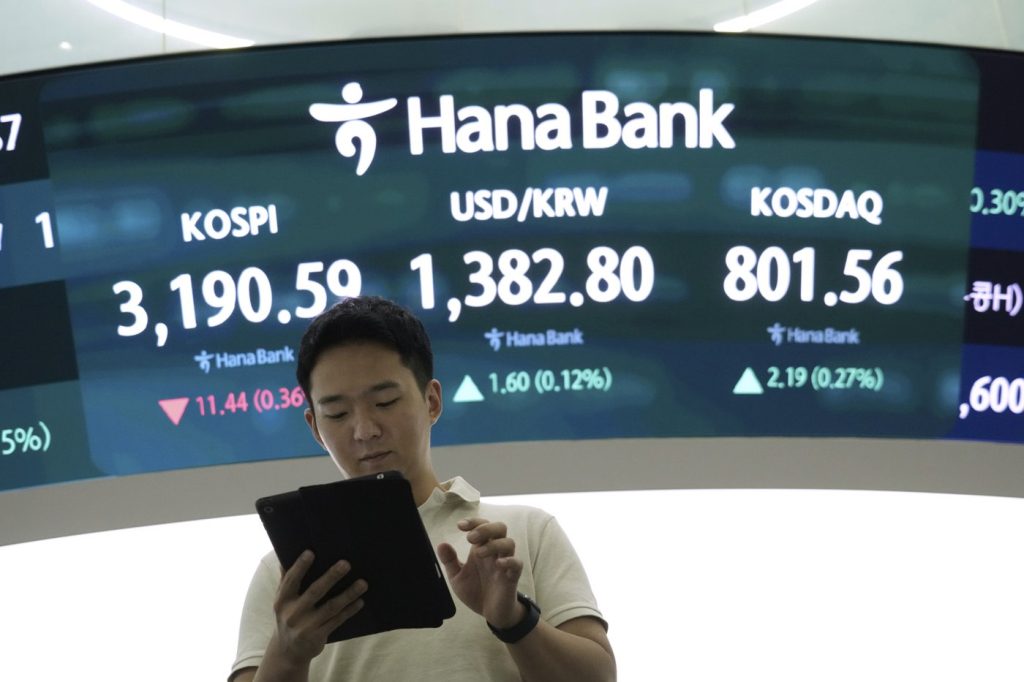TOKYO (AP) - Asian shares experienced a mixed performance in early Tuesday trading, primarily driven by investor concerns regarding President Donald Trump’s latest updates to tariffs, which have been a focal point in the ongoing trade tensions.
In Japan, the benchmark Nikkei 225 index saw a slight increase, rising 0.1% to 39,507.28. Meanwhile, Australia’s S&P/ASX 200 recorded a 0.4% gain, reaching 8,602.70. Conversely, South Korea’s Kospi experienced a modest decline of 0.2%, settling at 3,195.72, while Hong Kong's Hang Seng dropped 0.1% to 24,172.79. The Shanghai Composite was affected significantly, dipping nearly 0.9% following reports indicating that China’s economic growth slowed in the last quarter, attributed to the escalation of Trump’s trade war.
The recent economic data released on Tuesday indicated that the Chinese economy grew at an annualized rate of 5.2%, down from 5.4% in the January-March period. On a quarterly basis, the growth rate was recorded at 1.1%, according to official government disclosures. These figures reflect growing concerns about the negative impact of Trump’s tariffs on regional exporters, despite ongoing speculation that he might eventually reconsider the implementation of these tariffs, which are not set to take effect until August 1, leaving room for further negotiations.
On Wall Street, trading on Monday showed a slight upward trend as the S&P 500 edged up by 0.1%, the Dow Jones Industrial Average gained 0.2%, and the Nasdaq composite increased by 0.3%. Additionally, the political landscape in Japan is also influencing market attitudes, as a nationwide election for the upper house of Parliament is scheduled for Sunday. Analysts suggest that the ruling Liberal Democratic Party faces challenges and may need to form coalitions to maintain its power.
If President Trump enacts all proposed tariffs on August 1, it could significantly raise the risk of a recession, posing challenges not only for American consumers but also amplifying pressure on the U.S. government’s debt levels relative to the economy's size, especially following substantial tax cuts that are likely to exacerbate the deficit.
Ulrike Hoffmann-Burchardi, global head of equities at UBS Global Wealth Management, expressed her belief that the current tariff escalations are a strategic move to enhance negotiating leverage. She anticipates that the administration may de-escalate, particularly if market volatility intensifies.
Brian Jacobsen, chief economist at Annex Wealth Management, noted the inherent complexity surrounding tariffs, suggesting that the market's reactions indicate concern but not outright panic over tariff discussions. In the interim, tariff uncertainty may continue to contribute to market volatility.
This week also presents several potential market flashpoints as the latest inflation data in the U.S. is expected to be released on Tuesday, with economists predicting an increase in inflation from 2.4% in May to 2.6% in June. Major corporations are slated to report their financial performances, with JPMorgan Chase and other prominent banks revealing quarterly results on Tuesday, followed by Johnson & Johnson on Wednesday and PepsiCo on Thursday.
In corporate news, Fastenal, a supplier of industrial and construction materials, reported stronger-than-expected profits for the last quarter, resulting in a 2.9% increase in its stock, even as it cautioned about sluggish market conditions. Kenvue shares rose by 2.3% after the company announced that CEO Thibaut Mongon is stepping down, amidst a strategic review aimed at simplifying operations.
In the realm of cryptocurrencies, significant movements were observed as Bitcoin reached new record heights. The upcoming week has been designated as Crypto Week in Washington, with Congress set to deliberate on several bills aimed at establishing the U.S. as a leading hub for cryptocurrency activity.
In energy trading, benchmark U.S. crude experienced a decline of 31 cents, settling at $66.67 per barrel, while Brent crude declined by 25 cents to $68.96 per barrel. Additionally, in currency trading, the U.S. dollar weakened against the Japanese yen, falling to 147.59 from 147.72, while the euro rose to $1.1676 from $1.1666.
AP Business Writer Stan Choe contributed to this report.











